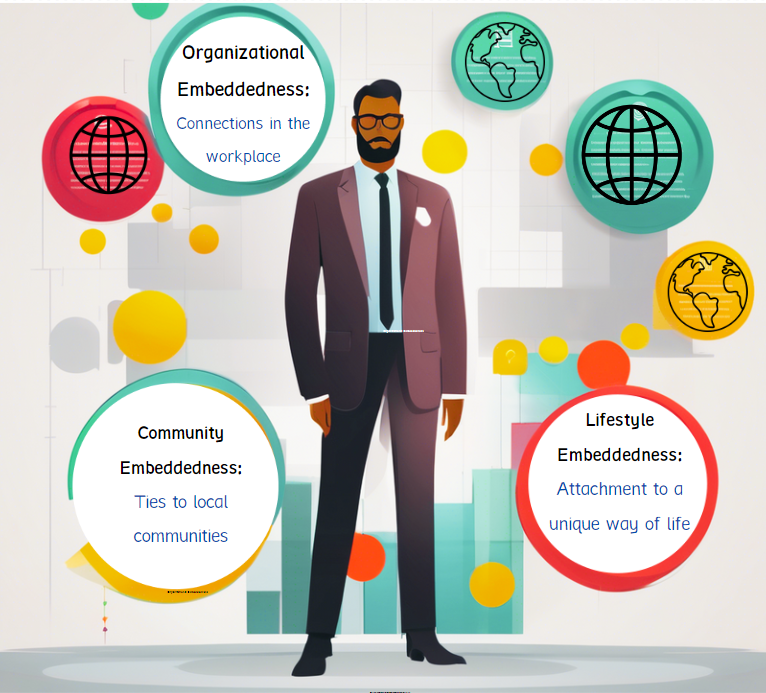Have you ever thought about the life of a long-term expatriate? A recent study titled “A typology of long-term expatriates: Conceptualization, consequences and future research” by researchers Jan Selmer, Margaret Shaffer, Stefan Jooss, and B. Sebastian Reiche, published in the Human Resource Management Review (2025), dives deep into the world of Long-Term Expatriates (LTEs)—those adventurous individuals who decide to extend their assignments abroad for more than a decade. This research unpacks the reasons why these individuals choose to stay in their host countries, how they navigate their prolonged stays, and the various impacts of their journeys on their personal and professional lives.

Aims of the Research
The study seeks to explore three important questions that resonate with many expats:
- Why do some expatriates choose not to return home after their assignments?
- How do these expatriates organize their extended experiences?
- What are the consequences—both personal and professional—of being an LTE?
These questions are particularly relevant in an increasingly globalized world where many professionals find themselves taking on roles that require mobility and adaptability. By delving into these inquiries, the authors aim to shed light on the expatriate experience from multiple perspectives, providing insights that can benefit both expatriates and the organizations that send them abroad.
The Concept of Embeddedness
At the heart of the study is the concept of embeddedness, which encompasses the various connections expatriates form in their new environments. The authors introduce a three-dimensional framework of embeddedness that includes:
- Organizational Embeddedness: This involves the connections and interactions expatriates have within their workplace, influencing their commitment and integration into the company culture.
- Community Embeddedness: This reflects ties to local communities, including social support systems and cultural integration. Strong community ties can provide essential networks that enhance expatriates’ emotional well-being.
- Lifestyle Embeddedness: Highlighting how expatriates become attached to a unique way of life shaped by their experiences abroad, this aspect emphasizes personal identity and cultural nuances that can significantly impact their overall satisfaction and sense of belonging.

This comprehensive framework offers a rich understanding of the diverse experiences among Long-Term Expatriates (LTEs) and serves as a valuable tool for interpreting their choices, behaviors, and overall satisfaction while living abroad.
Distinction Between Assigned and Self-Initiated Expatriates
Understanding the difference between Assigned Expatriates (AEs) and self-initiated expatriates Self-Initiated Expatriates (SIEs) is also crucial in this context:
Assigned Expatriates (AEs):
AEs are individuals who are relocated by their organizations to work in a foreign country. They typically benefit from structured support systems provided by their employers, which facilitate their integration into the new environment. This organizational backing contributes to their loyalty and emotional investment in the host country, making the prospect of returning home less appealing. AEs often have access to resources that help them navigate cultural and workplace adjustments, enhancing their overall experience abroad.
Self-Initiated Expatriates (SIEs):
In contrast, SIEs are those who choose to move abroad without direct support from a company. This independence grants them the flexibility to select their roles and locations based on personal preferences. However, to successfully adjust to their new surroundings, SIEs must actively engage in building their professional and social networks from the ground up. They take deliberate steps to connect with others, enhance their language skills, and gain a deeper understanding of the local culture.
To thrive in their host country, SIEs often seek out friendships and professional contacts that enrich their experiences. By proactively immersing themselves in the local community, they can foster strong connections that positively influence their sense of belonging. This proactive approach not only aids in their adjustment but also encourages personal and professional growth throughout their expatriate journey.
Key Findings
Let’s break down the insights that answer the key questions posed at the beginning of the research:
1.Why Do Some Expatriates Choose Not to Return Home After Their Assignments?
For many expatriates, the decision to extend their stay abroad is influenced by a blend of push and pull factors. Here’s a closer look at how these factors influence their choices:

Push Factors
- Feelings of dissatisfaction with aspects of life in the host country can motivate a desire to return home.
- A longing for familiar surroundings can also play a role in the decision to repatriate.
Pull Factors
- Strong personal relationships formed during their time abroad create emotional bonds that make leaving more difficult.
- Career opportunities that arise in the host country can provide compelling reasons to stay, particularly for AEs who are integrated into their organizations.
- The enriching experiences gained from immersing oneself in a new culture can transform perspectives and enhance personal growth.
Ultimately, both Assigned Expatriates (AEs) and Self-Initiated Expatriates (SIEs) discover that life in their host countries offers unique rewards that can outweigh the comfort of home, leading them to embrace their new identities and opportunities.their host countries offers a rich mix of adventure, diversity, and personal growth, leading them to embrace their new identities fully.
2. How Do These Expatriates Organize Their Extended Experiences?
When expatriates decide to stay longer, they find themselves carefully weighing their options about how to structure their lives:
- Staying Put: Assigned Expatriates (AEs), who often have established connections within their organizations, might feel more inclined to remain in a familiar host country where they have built a sense of belonging. Their roles often allow them to integrate more deeply into the workplace culture, making it easier to sustain their social networks and community ties.
- Seeking New Adventures: On the flip side, Self-Initiated Expatriates (SIEs) may be driven by curiosity and a desire for new cultural experiences. They have the flexibility to explore different locations, seeking job opportunities or personal growth that align better with their evolving career aspirations. This quest for exploration not only widens their professional horizons but also enhances their personal journey.
- Consideration of Personal Factors: Regardless of their status as Assigned Expatriates (AEs) or Self-Initiated Expatriates (SIEs), expatriates must also consider personal factors in their decision-making. Family needs, lifestyle preferences, and long-term goals play significant roles in their plans. For instance, an expatriate with children might prioritize a stable school environment, while a single professional may prioritize career opportunities and social connections.
This multifaceted decision-making process reflects an intricate balance of professional ambitions and personal aspirations, ultimately shaping the futures of expatriates.

3. What Are the Consequences—Both Personal and Professional—of Being an LTE?
3.1 Intrapersonal Outcomes (Professional)
Intrapersonal consequences may involve a range of outcomes for the individual expatriate, including adjustment, work performance, career advancement, and repatriation.
Adjustment
- The adjustment experiences of expatriates can differ between assigned expatriates (AEs) and self-initiated expatriates (SIEs). Research indicates that SIEs often report higher levels of interaction adjustment, primarily due to their greater command of the host-country language. This language proficiency facilitates better communication and helps SIEs establish relationships more quickly compared to AEs, who may not have the same level of fluency and thus might face greater challenges in forming connections.
Work Performance
- Research has shown that organizational embeddedness is associated with both work and interaction adjustment for AEs. Generally, AEs enjoy greater task and contextual performance than SIEs due to their stronger work and career motives. AEs tend to develop more organizational knowledge and a valuable network of contacts within their companies, which enhances their productivity and effectiveness.
Career Advancement
- Career advancement opportunities for AEs are typically more favorable than for SIEs. AEs are likely to remain with the same employer, which provides a clearer path for progression within the organization. However, even AEs may face limitations in promotion opportunities due to biases in performance evaluations related to spatial, temporal, cultural, and linguistic differences between headquarters and local offices.
- In contrast, SIEs often navigate their careers independently and must establish their own paths for advancement. This lack of immediate organizational backing can lead to slower career progress. However, the experience SIEs gain from navigating different job markets and cultures can enhance their global marketability and resilience.
Repatriation
- The decision to repatriate generally varies between the two groups. AEs often return home while still employed with the company that sponsored their international assignment, at least for a couple of years. In contrast, SIEs usually have to sever ties with the host country firm and seek new employment back in their home country after their assignments end.
3.2 Interpersonal Outcomes (Personal)
Interpersonal consequences of being a long-term expatriate involve the connections and relationships that expatriates cultivate with relevant others, including their professional networks, accompanying family members, family members at home, and Host Country Nationals (HCNs) both at and outside of work.
International Network
- Assigned Expatriates (AEs): AEs often naturally expand their international networks as they embark on new foreign assignments. Their organizational ties can facilitate boundary spanning and greater knowledge exchange between different organizational units, benefiting both their careers and the company they represent. They are well-embedded in the organization and utilize their connections to advance both personally and professionally.
- Self-Initiated Expatriates (SIEs): In contrast, SIEs view the expansion of their networks as a strategic necessity for potential future transfers. Since they are less embedded in a specific organization, they focus on developing contacts that directly align with their personal career interests, often prioritizing immediate opportunities over long-term organizational benefits.
Connections with Accompanying Family Members
- For both AEs and SIEs, frequent moves can require regular adjustments in family roles, which may destabilize connections among family members. However, shared relocation experiences can also strengthen these connections, fostering a sense of teamwork and mutual support as families navigate the challenges of expatriate life together.

Connections with Family Members at Home
- Advances in technology facilitate improved communication with family back home, benefiting both AEs and SIEs. However, AEs typically have access to paid home visits, enhancing their ability to maintain familial relationships compared to SIEs. For SIEs, the changing temporal and spatial distances may complicate these connections, leading to challenges in maintaining in-depth familial contact, particularly when they start new families in their host locations.
Relationships with Host Country Nationals (HCNs)
- AEs may face relatively weak ties with HCNs, as local colleagues might perceive them as temporary and less likely to develop strong relationships. This perception can limit the emotional support and connections vital for successful integration into the host culture. They often strive to develop sufficient relationships to fulfill personal needs, such as accessing information and advice.
- Conversely, SIEs may have more motivation to cultivate local relationships, leading to stronger ties over time as they invest in their communities. As SIEs become better integrated, their relationships with HCNs tend to enhance their understanding of the local culture, increasing their quality of life and overall satisfaction.
Practical Implications for Organizations
What can organizations learn from this research? The insights derived from the study can inform how businesses approach the management of their expatriate programs:
- Enhanced Support Systems: Employers should create a welcoming environment that prioritizes integration for both assigned and self-initiated expatriates. Providing tailored support systems, such as mentorship programs and cultural training, can significantly enhance the expatriate experience and facilitate smoother transitions.
- Networking Opportunities: Encouraging expatriates to engage in cross-cultural projects and international conferences can help expand their professional networks. It is also essential to connect them with local communities to foster social ties, enhancing their overall adjustment and satisfaction.
- Family Support Programs: Recognizing and supporting the relocation needs of accompanying family members can lead to better overall well-being for expatriates. Organizations that provide resources, such as assistance with housing, schooling, and other logistical concerns, often see increased loyalty and satisfaction from their expatriate employees.
- Cultural Integration Efforts: Organizing cultural events and social gatherings can enhance relationships between expatriates and local employees. Such initiatives help combat feelings of isolation and promote personal and professional bonding, which is critically important in fostering a sense of community.
- Career Development: Organizations should also recognize the unique value that each type of expatriate brings to the table and tailor career advancement pathways accordingly. This means creating flexible career tracks that allow for growth across multiple countries, rather than limiting advancement to a single location.
Navigating Life as a Long-Term Expatriate
The journey of a long-term expatriate is multifaceted and deeply personal. As global mobility rises, it’s essential to understand the unique experiences and challenges faced by LTEs. Embracing these complexities enables both expatriates and their supporting organizations to maximize potential and foster successful outcomes.
This research sheds light on the motivations, organizational structures, and implications of long-term expatriation, emphasizing the differences between assigned expatriates and self-initiated expatriates. This understanding can significantly shape career paths, relationships, and overall well-being.
For more details, the link to the study is below:








